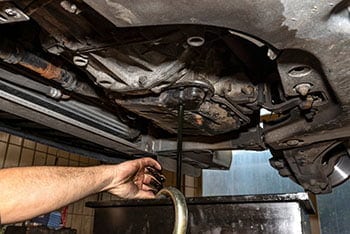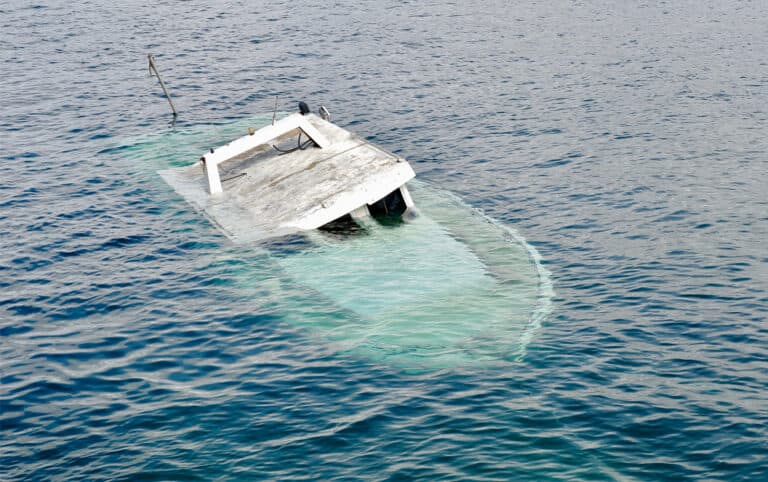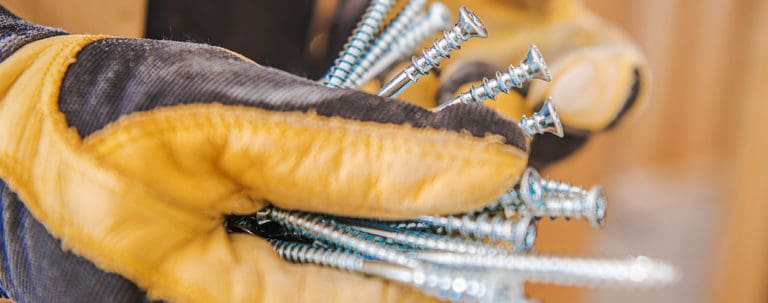Affiliate Disclosure: Some of the links in this post are affiliate links. As an Amazon Associate, we earn from qualifying purchases. Read our affiliate policy for more information.

Best Oil Extractor for Boat – Does the Easy Oil Change Work?
In this article, we talk all about engine oil extractors. In particular, we are interested in oil extractors for boats, as this is a rarely covered subject (and boats are what our site is all about).
Not only will we suggest the best oil extractors for your boat, but we will also include a buyer’s guide to help you know what to look for in an oil extractor when doing your own shopping. Are you ready? Let’s go!
Finding the Best Boat Oil Extractor
So long as you own a vehicle, whether it’s a car, boat, or lawnmower, you’re going to have to deal with engine oil. In fact, you’re going to have to change engine oil on the regular.
You could either take it to the mechanic and have them do it for you, or you could do it yourself and save yourself the money.
That said, saving yourself the money oftentimes means being especially extravagant with your time.
In a Hurry?
OEMTOOLS 24389 5.3 Liter Manual Oil Extractor
This excellent oil extractor is a manual one, but it comes at a good price and
includes an auto shut off functionality.
Changing engine oil is quite a hassle. You have to lift the vehicle, crawl under it, clean any spilled oil, and so on. If you don’t like that kind of hassle, then changing your own oil might not sound like an especially appealing job to you.
However, there is a solution for those who would like something a little more straightforward, and easier too. You will have to spend some money upfront, but it pays great dividends later down the road.
That solution comes in the form of an oil extractor.
An oil extractor helps you to change your oil in a clean and efficient way, all within far less time than you would take using conventional methods.
Now let’s take a look at the list of the best ones currently on the market.
Best Oil Extractor for Boat – Our Top 5
Marine Oil Change Pump Reviews
1. OEMTOOLS 24389 5.3 Liter Manual Oil Extractor
This is a manually operated pump, but don’t let that discourage you. It is quite dependable and does its job well. You don’t need to go under your boat or shimmy it in order to extract the oil. It also has very simple use instructions so anyone, whether a DIY enthusiast or a professional, can understand and follow them.
The oil is extracted via the boat’s dipstick tube, and the oil itself is collected from the bottom of the tank.
This engine oil extractor comes with a small floater in its receptacle. Once the oil fills the receptacle, the receptacle gets pushed up and automatically shuts off the intake valve, meaning you don’t have to worry about a spill happening while extracting oil.
The lid is easy to remove, so disposing of the extracted oil is a very quick and convenient process. Just remove the pump’s lid and dump the oil into a waste pit or recycle tank.
This is also a multipurpose engine oil extractor. It can be used to extract not just engine oil, but also transmission and lubricating oils from boats as well as other vehicles. It can even extract low viscosity liquids like water and coolant.
Finally, this is an affordable oil extractor to own. Since it’s a manual oil extractor, it’s much cheaper than more hi-tech options, and it’s also durable, meaning it will serve you for many years hence.
2. EWK 6.5L Oil Extractor Pump
Yet another engine oil extractor that saves you from the hassle of having to either lift your boat or crawl under your boat to remove the oil. All you need to do is open the hood of your boat and insert the tube into the dipstick.
Make sure your boat has an opportunity to cool off before using the extractor, as the pump works at temperatures up to 2000 degrees Fahrenheit. If you’ve been out on the water, it might be a good idea to wait about 15 minutes before using the extractor.
Also, if your boat has been at rest for at least 4 hours, it’s a good idea to warm it up a few minutes before using the extractor. You can then take the oil dipstick out and insert the extractor’s tube into the dipstick pip to the very bottom of the oil pan.
Once the connection is set up, you can connect the air compressor using the quarter inch NPT quick coupler and set the pressure of the pump to operate between 40 and 170 psi. Make sure the tubes are firmly connected before you start the extraction process.
You have two options with this oil extractor: you can either get the manual version or the pneumatic version. Pick whichever works for you, though the pneumatic version will extract oil much faster.
Something else I like about this oil extractor is that it is highly portable. It’s also very lightweight, so hauling it around by hand should be easy.
3. Qiilu 12V 60W Oil/Diesel Fluid Pump Extractor
This is one of the most efficient and fastest engine oil extractors on the market, and it also comes at a decent price for all of its capabilities. It’s also pretty easy to use. All you have to do is pass the hose into the dipstick tube, and take it all the way to the bottom of the oil pan.
Once it’s placed in the dipstick tube, connect the outlet and then fix the two battery clamps that come with the extractor to your boat’s battery. When the connection is complete, switch the pump on to start it. This pump will do very fast work of pumping out the oil from your oil pan.
It’s also a highly versatile pump as it extracts other fluids, apart from engine oil. Just connect it the way you normally do and it should be able to remove diesel, coolant, and even water. However, note that it is not meant for the removal of gasoline.
It’s also versatile in the sense that you can use it on vehicles other than boats. You can use it on cars, trucks, tractors, and heavy machinery as well. With its great portability and light weight, you can carry it with you wherever you go, making the job of extraction that much more convenient.
Something I love about this oil extractor, compared to the other ones above, is that it comes with a one year warranty. That gives you peace of mind, knowing the manufacturer is confident about the quality of their products. You can contact the customer service whenever you have a problem, and they respond promptly.
4. DasMarine 12V 60W Oil Change Pump Extractor
The build of this material is plastic and aluminum, making it one of the more durable ones in the market. The materials are overly robust, and the plastic comes in options of yellow and black. Combined with the sleek sheen of the aluminum, it makes this extractor a beauty to behold.
This extractor uses an input voltage of 12V DC, with 5A of current and 60W of power. It also needs temperatures of between 40 and 60 degrees to operate properly, with the extracted oil flowing out at a rate of 1 liter a minute. Note that you can use a power converter if you have a power source greater than 12 volts.
It’s also a highly volatile engine oil extractor, as it can extract oil from other vehicles, such as tractors, cars, and machinery, so not just boats. Top that off with high portability and the ability to extract other fluids, such as water and gearbox, and you have a winner!
5. Electric Portable DC 12V Transfer Pump Extractor Suction Oil Fluid Water For Auto Marine Boat
This is an excellent boat engine oil extractor for amateurs and enthusiasts. It comes with a DIY pump kit, which makes it easy to assemble it really fast. It’s also quite affordable.
Unlike many of the other extractors on this list, this engine oil extractor removes oil at a very fast rate of 4 liters per minute. That’s extremely fast, and the pump comes with high power specifications, as well as a design that enhances efficiency.
The input voltage is 12 volts DC, though you can use a power converter if you have a higher voltage power source. The 60 watt power rating also places it among the most powerful engine oil extractors on the market.
In terms of connections, this engine oil extractor comes with a PVC outer pipe that’s 3 1/8 inches long. The inner tube is 39 3/8 inches long and made from nylon, and a third pipe that comes with the kit is also 39 3/8 inches. And made of brass.
The power capacity of the extractor, combined with the tubes, allow them to withstand pressures up to 0.8 MPA, which increases efficiency. It’s also quite lightweight and portable.
Extracting a Boat Engine Oil – Buyer’s Guide
Buying a boat oil extractor, or an oil extractor for any other kind of vehicle, by the way, isn’t just about going for the first product you see. It can literally pay (in money saved or value earned) to have general information about oil extractors as well as specific information about what features to look out for when buying one.
That’s what this buyer’s guide is for. By the end of it, you should be armed with valuable tips to make you a power purchaser of oil extractors for boats and other kinds of vehicles.
Oil Extractor vs Drain Plug: What is the Difference Between Draining Engine Oil and Extracting It?
While the two both involve removing oil from the engine, and are often confused, they work very differently.

Draining engine oil involves removing the plug from the engine (traditionally at the bottom for cars, though it can be in other positions on a boat) and letting the used oil flow out by the force of gravity.
This process is usually very fast since it’s supported by gravity. The downside is that it is a messy process since the oil can spill on you if you’re underneath the vehicle.
There’s also the bit about having to lift the vehicle or go under it in order to drain it. The process can be a bit difficult.
Oil extraction is exactly what it sounds like. A machine is used to extract the oil directly from the engine, and it flows into a reservoir on the extractor. You don’t have to go under the car or lift it. Oil extraction uses tubes through which the oil flows. As a result, it is not a messy process.
The Categories of Boat Oil Changer
All oil extractors can be divided into 3 major categories: manual extractors, pneumatic extractors, and electrical extractors.
1. Manual Oil Extractors
These extractors are great for use on small boats. To operate a manual oil extractor, you need to pump the system, using your own effort to create a vacuum and generate suction.
Obviously, such an extractor wouldn’t be suitable for large boats with large amounts of engine oil.
2. Pneumatic Oil Extractors
Pneumatic oil extractors are connected to an air compressor, which uses a pressurized airflow to suck the air out of the engine. These are powerful oil extractors and are among the most popularly used, not just by boat owners, but by owners of other vehicles as well.
The thing about pneumatic oil extractors, however, is that sometimes the air compressors can fail, or there might not be a source of electricity (since they use mains electricity). Due to that, they always come with a manual backup unit.
If that ever happens, you should know how to operate the manual backup unit, and have enough energy to do it.
3. Electric Oil Extractors
Electric oil extractors function much like pneumatic oil extractors, with the main distinction being that electric oil extractors are capable of pulling their power from the boat’s battery. This makes this type of oil extractor very valuable to have during an emergency.
They are especially useful in maritime environments, where energy sources can be scarce.
What are the Benefits of an Oil Extractor?
- An oil extractor saves you time. When you have one, especially as a boat owner, you don’t have to make so many (rather expensive) trips to a mechanic as you can extract and replace the oil in your boat by yourself.
- You don’t just save time, but also money. You don’t have to pay repeatedly for the service of extracting your oil. All you have to do is spend once on a boat engine oil extractor and you’re set. You also don’t have to pay the markups they tack on engine oil and filters when you go to mechanics. You can now shop for the most affordable ones.
- An engine oil extractor is low maintenance. If you buy a good quality one, it will give you service for many years, and you can take it with you wherever you go.

What Features Should You Look for When Purchasing an Engine Oil extractor?
1. The Size of the Reservoir
One of the most important things to consider when choosing a boat engine oil extractor is the size of the reservoir. Depending on the size of your boat, and the task you’re carrying out, the kind of size you need will vary.
It’s not just about the size of your boat, though, but also about how many you have, and how many times you do oil extractions in a day. If you do lots of them, then you should go for an oil extractor with a large reservoir. That way, you’ll dump the oil fewer times in a day.
2. Convenience and Safety
It’s also important to consider the safety and convenience of the engine oil extractor you’re getting. Many manufacturers ensure to include safety features in their products so as to protect you from dangerous situations.
Of course, the whole point of an engine oil extractor is to make the job of extracting engine oil convenient, so the convenience factor is baked right into the concept. However, manufacturers can and do go the extra mile to ensure the user is even more comfortable.
Some examples of this are long extraction tubes, a firm lock in the joints, an automatic shut-off valve, and so on. Look for features that would make your job of extracting engine oil that much easier.
3. The Size of the Extractor
The overall size of the extractor matters just as much as the size of the reservoir (and is often positively correlated to it). As soon as you consider purchasing an engine oil extractor for your boat, you must also consider storing it. That’s why size is so important, as it determines your storage needs.
If you’re going to be moving around a lot, and will be doing much of the extraction work by yourself, you might want to get a small extractor. On the other hand, if you’re going to be doing the extraction in one central place, and have enough storage space, a large one should be perfectly fine.
4. The Portability of the Extractor
This is in direct relation to the issue of size. Once you’ve extracted the oil from your boat, you’ll need to take it and dump it somewhere else. If you’re buying a small engine oil extractor, handles help with that.
However, if it’s an especially large one, handles alone will not be enough. In that case, you’ll have to consider buying one with wheels so that it can be moved easily. It should also be designed in such a way that it is very comfortable to use it.
5. The Durability of the Extractor
You don’t want to purchase a boat engine oil extractor too frequently. You want to buy one and then not need to think about buying another for a very long time. Look at the quality of the build and material, as well as the reputation of the manufacturer.
Bonus points if they offer a warranty, as it indicates confidence in their own product.
6. The Versatility of the Extractor
An important point to make here is that oil is definitely not the only fluid found in a boat that might need extracting. There are other fluids as well, and so it would be beneficial to have an extractor that can deal with all of them.
The more general term for such an extractor is a fluid extractor, as opposed to an oil extractor. If you think you might need to extract different fluids apart from oil from your boat, consider getting a versatile fluid extractor. You will save yourself both time and money in the process.
7. The Price of the Extractor

No proper consideration of the purchase of anything can fail to include the price. Your budget will ultimately determine the range of possible engine oil extractors you can get for your boat.
Whatever your needs, you can only go for an engine oil extractor that is within your budget. Sure, you may have to sacrifice some features, but if it meets your core needs then you should be okay.
If you have an especially small budget, go for a small but good quality extractor that meets your basic needs. The larger your budget, the larger the size of the extractor you can buy and the more features you can look for. At the end of the day, however, remember to go for the best product within the reach of your pockets.
Frequently Asked Questions
How Does an Oil Extractor Work?
Engine oil extractors for boats come in different shapes and sizes, and so there is no single uniform way in which they all work. There is a general principle, however, and that is that they create vacuum some way in the reservoir. Nature abhors a vacuum, and so the oil will rush up through the tube inserted into the boat’s dipstick to the bottom of the tank. It comes up due to suction and, through this process, is emptied into the oil extractor’s reservoir.
Different pumps use different sources of energy to generate that vacuum. Some of them use human energy via manual operation while others use electricity. At the heart of it, however, they’re all using suction to extract oil.
How Do You Clean an Oil Extractor?
For most engine oil extractors, this isn’t very difficult. They come with a recycling container that you can dump the extracted oil into. Once you’re done, get a jug or some other container and put it below the drain valve of the extractor. Open the drain valve and allow the oil to drain into the container.
I have to point out that this process can be really slow if left to take its own course. You can speed it up by connecting an air hose to the oil extractor on the side of the compressor output. Once you apply pressure to the pump the oil will rush out quickly.
Once you’re done draining the oil from the reservoir, clean the inside and outside of the pump with hot water. Make sure you dry it off completely, as any traces of water on the inside will cause the oil to emulsify, which will make it very difficult to recycle. Alternatively, you can consider cleaning the inside and outside with alcohol, rather than water, as alcohol is volatile and evaporates rapidly.
What is the Benefit of Using an Oil Extractor?
Oil extractors are machines of convenience. They make the process of extracting oil clean and fast, ensuring all the oil gets extracted without being messy. Another great advantage that comes with an oil extractor is portability. You can carry it to where the boat is for oil extraction, rather than having to move the boat itself. Also, if you get a versatile oil extractor, you can use it to extract other kinds of fluid, not just oil. Some of them can be used to extract water and diesel. Others also work on automobiles other than boats.
Can You Use an Oil Extractor to Pump a Gas Tank?
No, unfortunately, you can’t. Engine oil extractors are designed to extract oil, water, or diesel, depending on how versatile the extractor is. Gasoline is a very volatile liquid and needs a unique pup to extract it. Otherwise, in an oil extractor, the volatile gasoline might release vapor, which might find its way around the motor and possibly cause an explosion.
How Long Should I Expect My Oil Extractor to Last?
The durability of a specific engine oil extractor depends on how frequently it is used, the quality of the material, and how much care is taken in its use. If you use the pump frequently, it will reach the end of its life span far quicker than if you use it just a few times. That said, on average, oil extractors should be able to serve you for 5 or more years.
Best Oil Extractor for Boat – Conclusions
And with that, we come to the end of our article on the engine oil extractors for boats. As you can see, having an engine oil extractor for your boat makes the work of pulling oil from it very easy and convenient, and saves you both time and money.
All of the products recommended on our list will give you great service for many years.
Happy sailing!
References
Last update on 2024-04-24 / Affiliate links / Images from Amazon Product Advertising API
Disclaimers
All product names, logos, and brands are property of their respective owners. All company, product and service names used in this website are for identification purposes only. Use of these names, logos, and brands does not imply endorsement.
It is our policy to make every effort to respect the copyrights of outside parties. If you believe that your copyright has been misused, please provide us with a message stating your position and we will endeavor to correct any misuse immediately.
Some of the links in this post are affiliate links. As an Amazon Associate, we earn from qualifying purchases. This means if you click on the link and purchase the item, we may receive an affiliate commission, at no extra cost to you. This helps us keep this website alive. Learn more here.
Amazon Disclosure
DesperateSailors.com is a participant in the Amazon Services LLC Associates Program, an affiliate advertising program designed to provide a means for sites to earn advertising fees by advertising and linking to Amazon.com. As an Amazon Associate, we earn from qualifying purchases. Amazon and the Amazon logo are trademarks of Amazon.com, Inc., or its affiliates.
Please refer to our Privacy & Affiliate policy for more details.



